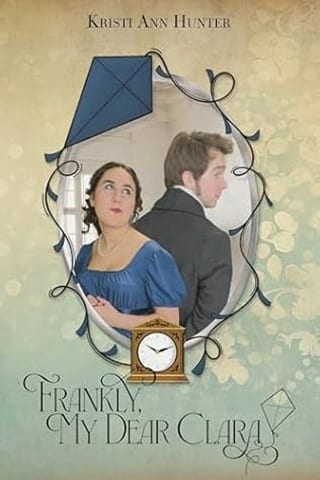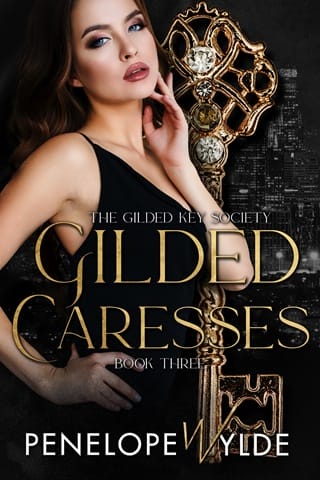7. Chapter Seven
H ugh deftly polished his fingerprints off the bezel before giving the hands of the clock a test wind. The smooth, satisfying glide was rewarding, but the fact that Mr. Johns would get the gratitude was anything but.
When Hugh had been an apprentice, Mr. Johns would praise his work and talk about making him a partner when he was older. Within a year of his transition from apprentice to employee, those statements had turned into eventually selling Hugh the business, as if he had the means to save enough without receiving a slice of the profits. Lately, if anything was said at all, Hugh wouldn’t be getting the business until Mr. Johns died.
That was, of course, unless the man suddenly remembered some long-lost nephew who deserved it more.
In those early years, Hugh had thought of Mr. Johns as a mentor and then possibly a friend. Now, he knew that to the older man, Hugh was nothing more than a business acquisition similar to every tool, bench, and spare part stocked in the workroom.
One day Hugh would be the man known for making the best clocks in all of England. He’d have his own shop, his own clientage, and his own reputation. Likely he’d have his own apprentices, too. And while Hugh knew better than to say he’d treat them like family when he hadn’t yet been in the position of mentor, he vowed to himself that he’d never make them a false promise.
Unfortunately, the bank account in which Hugh was stashing the funds for that day was not growing as much as he’d like. He wasn’t going to be hanging out his own shingle anytime soon, unless God sent an investor or an opportunity or both his way.
Hugh made a note on the invoice and slid it to the side of the desk before setting the repaired pocket watch on top of it. Then he pulled out his uncompleted sketches for a new chronometer design. He was all but certain his idea would work, changing the quality of timekeeping devices around the world and improving the preciseness of ship navigation.
If he couldn’t find the time, money, or location to build it, though, no one would ever know about this change but him.
He could gamble everything he’d saved so far to secure the supplies and a space to work, but if he failed to gain attention or opportunity quickly, he’d be right back where he’d started at the end of his apprenticeship. Maybe even worse off, because Mr. Johns might not keep him employed if he learned about it.
Hugh took a deep breath and slid his notes back into their hiding spot. Patience was a virtue, and he’d do well to ask God for a little more of it. It was best for him to keep the job that paid enough to prevent his having to beg his uncle for a bed in the vicarage. One day, God would provide another path forward.
Mr. Johns walked into the back workroom, ignoring the other clocks and watches awaiting repairs, the gears in need of labeling and storage, and the tools that hadn’t been put away. The place was clean—dust wasn’t good for the interior mechanisms after all—but the general clutter created a different environment from the elegant showroom at the front of the shop.
Squinting even through his glasses, Mr. Johns picked up the watch and looked through the notes Hugh had made on the paper.
Several nods and a few mutterings of springs and latches later, Mr. Johns gave Hugh a smile. “Well done, lad.”
Lad? Was Mr. Johns’ eyesight and memory so far gone that he didn’t know Hugh was a man of six and twenty? Or did he think treating Hugh like he was still an apprenticed child would keep him content at his back room bench?
“Thank you, sir,” Hugh grumbled because the reality of his situation dictated he do so.
The bell on the front door clanged, and Mr. Johns nodded toward the showroom. “Go on out and help that customer.” The old man grinned as he slid the pocket watch and invoice into a leather satchel. “I think I’ll see to this delivery myself.”
Of course he would. The pocket watch belonged to Lord Lindbury. The viscount Hugh had visited yesterday wasn’t enough to garner Mr. Johns’ attention, but a marquis was.
Hugh couldn’t stop a slight grin from forming as he remembered the events that followed the clock delivery. Never would he have guessed he’d spend the afternoon chasing kites.
Never would he have guessed that more than once today he’d have found his mind wandering away to think about a certain young lady.
In his moments of desperation Hugh could almost convince himself he had enough money to strike out on his own, but not even in his dreams did he have the funds or position to consider courtship of a woman. Particularly if—lady or not—she was accustomed to the comforts that came from living in a fine townhouse in Mayfair.
Hugh shook his head and rose to move to the front room. The chances of him seeing any of yesterday’s brief companions were small, so thinking of them was a waste of his time.
Except one of them was standing in the clock shop.
It wasn’t the intriguing young lady or the personable viscount, but Mr. Woodbury standing in the shop with his hat in his hand as he examined a large case clock in the corner of the store.
“It is a pleasure to see you again.” Hugh stepped up to the man, curious but also cautiously optimistic about his presence.
Mr. Woodbury grinned at him. “Is it? Even if I don’t come bearing significant business?”
Surprisingly, Hugh wasn’t disappointed. The afternoon had been the most enjoyable one Hugh could remember in a long while. He returned the smile with a nod. “Even then.”
“Excellent.” Mr. Woodbury nodded toward a clock on the wall. “Do you make these?”
“Some of them. I don’t carve the wooden ones, but I’ve placed the gears inside.”
“Makes sense.” Mr. Woodbury gave the intricate clock one last look before turning to Hugh. “Do you play billiards?”
The abrupt change of topic sent Hugh’s head momentarily reeling before it fully comprehended the question. “I . . . well, yes, I suppose. I know the activity, but I haven’t played much.” Billiard tables weren’t common furniture in the rooms men like him could let. Nor was he spending his limited funds on club memberships, even if there was one that wanted him to join.
Hugh lived in a small set of rooms in a nearby side street, not the spacious apartments like the ones that surrounded the square they’d trespassed in yesterday. His evening entertainment was limited to books from his uncle or cards with one of his neighbors.
“As long we I don’t have to explain the rules, you’re invited.” He scrunched his nose up for a moment. “Actually, I’ll invite you even if you don’t know the rules.”
“Invite me where?” Hugh said carefully.
“To dinner.”
“Dinner?”
“Yes. You know, mealtime, occasionally a ridiculous number of removals, often used to socialize, at least here in the city.”
“I am aware of the concept, yes, but—” Before Hugh could clarify whether he was being invited to the viscount’s house by his cousin or meeting the man at a restaurant later, another gentleman entered the shop.
He was older, with white hair pulled back in a low queue and a captain’s jacket slung over his shoulders. After glancing quickly about the room, he barked, “I’m looking for Johns.”
Hugh snapped his spine straight and turned to face the customer, forcing the confusing social encounter he was in the middle of to the back of his mind. “I’m afraid he’s on a delivery at the moment. Might I be of service?”
The man gave Hugh a long look. “You’re not an apprentice here.”
“No, sir.” Though Hugh wasn’t certain what he was.
The man thought a minute before reaching into his pocket and pulling out a pencil and notebook. He scratched out a few lines, ripped the paper from the book, added a card from a silver carrier tucked into his other pocket, and extended the papers to Hugh.
“See that he gets this. My wife got a watch from Johns last Christmas, and it’s kept time better than anything I’ve seen. I only have to set it once a month as long as I keep it properly wound.”
The piece the man pulled from the tiny pocket of his waistcoat was one Hugh immediately recognized. He’d been quite proud of that piece and had been hoping to submit it to the Royal Observatory when Mr. Johns had up and sold it.
Hugh glanced at the paper and nearly let out a shout of excitement. The Royal Observatory was seeking a new chronometer for more accurate maritime navigations. The selected maker would also get the order for a Standard Astronomical Clock for the new tower being built in Greenwich.
It was the sort of opportunity that could make a name for a man.
Hugh swallowed hard to regain his ability of speech. “Of course, sir. I’ll see that the maker of that watch learns of this opportunity.”
“See that you do.”
Then the man was gone.
And Mr. Woodbury was laughing as he read the note over Hugh’s shoulder. “Maker of the watch, hmm?”
“Well, Mr. Johns doesn’t trouble himself with innovation much these days.” The old clockmaker had been good several years ago, but anything he submitted now would be a replica of what the Observatory already had in their possession.
Mr. Woodbury bumped Hugh’s shoulder with his own. “Bring that same technical precision to the billiard table and we’ll win for certain.”
“We’ll win?” Hugh folded the note and stuck it in his pocket. He’d copy down the information before passing it along to Mr. Johns. “I’m sorry, but why am I playing billiards?”
“Because Ambrose and I tire of playing only each other and my cousin only has one friend that’s willing to shoot with me.” His lips twisted into a wry grin. “They’ll pay me to join them on the pitch but can’t stand to share a room with me.” He clapped his hands together. “So. Dinner? Six o’clock? At Eversly House, of course.”
Of course. Hugh’s mind was spinning at the rate he was receiving possible answers to prayer. This wasn’t exactly what he’d asked for, but it was a far more realistic turn of events than the aristocrat himself waltzing through the door with aspirations of being a silent partner in a new store.
And now that he had it, he wasn’t sure what to do with it.
Beyond accept the invitation, of course. “I would be honored.”
“Remember that when you’re losing.” Mr. Woodbury plopped his hat on his head.
“I thought you said we were going to win.”
Mr. Woodbury shrugged one shoulder. “I suppose I lied, then.” He grinned. “The question is which time?” Then he tipped the brim of his hat in Hugh’s direction before sauntering out the door of the shop.
Clara’s tea had gone cold ages ago, but still she stared at it, as if the very force of her attention would heat the cup again. The alternative was to gape in horrified astonishment at the women around her.
She was attending her first meeting of the Virtuous Ladies Society for the Care of Wounded Soldiers and not once had they said anything about the plight of soldiers coming home with missing limbs and terrorized hearts. They’d had plenty to say about the appearance, manners, and prospects of the people pouring into London for the coming Season, though.
If this was what passed for charity in London, she could well understand why her father hadn’t wanted to accompany them for any portion of the Season.
How could Mother stomach it? Clara glanced in her direction, but the woman who’d taught Clara how to properly fill baskets for the poor, keep a visit to the ill short but meaningful, and remember the names of every parishioner didn’t seem particularly bothered by the current conversation. Not that she was participating much. Was that because she didn’t care to gossip or because she hadn’t the slightest idea who the people under discussion were?
Three weeks ago, Clara would never have allowed such a traitorous thought to occur to her, but Clara didn’t recognize the woman her mother had become since arriving in London. Instead of being capable, confident, and steady, she was screaming at kites and fretting over lace and tea.
Aunt Elizabeth presided over the gossip from her seat to Clara’s right. There had been little interaction with Aunt Elizabeth over the years, but Clara had once thought her fascinating. She would bring exquisite chocolates and parade about in smiles and fanciful dresses when she came to the parsonage to leave her son in his aunt’s care or take him back to school.
The prolonged exposure was making her far less fascinating.
Where was the resolve she’d gained yesterday to use this time in London to craft the best possible future for herself? It had crumbled under the prospect of enduring afternoons such as this one for the next three months. Perhaps being a spinster wasn’t such a bad option. Yes, she would be something of a strain on her parents and yes, her future would be very uncertain, but it had to be better than this.
She could make her gowns stretch a little further, let her room grow a little colder, and leave her plate a little emptier. Then, when her father passed on, there was sure to be a widower or two around that would marry her for her caregiving skills.
It could work. She could make it work.
One glance to her left had her abandoning the fleeting dream. Such a future would devastate her mother. She’d circled right back around to making the most of her time in London.
She just didn’t know if this was anyone’s best.
With a sigh, Clara leaned toward her aunt. “Shouldn’t we discuss more pressing matters?”
Aunt Elizabeth frowned. “Such as?”
“Er, well, the wounded soldiers?” Clara glanced about the circle of women. That was what this group was about, wasn’t it?
A frown of confusion puckered Aunt Elizabeth’s forehead. “But we’ve already discussed that, dear. Weren’t you listening? We’re going to ask the attendees of Lady Bertram’s ball to purchase flowers for their lapels or hair. The money will go toward feeding those living in the encampment.”
That was it? “But . . .” Clara took a deep breath as she gathered her thoughts. “Who does that feeding?”
Aunt Elizabeth waved her hand about, genuine confusion on her face. “Someone from the church near the river.” She gave a tense laugh. “You don’t expect us to go do it, do you? We’d be attacked or robbed if we ventured into that area of Town.”
Clara couldn’t refute her aunt’s words, as she didn’t know enough about London to say whether or not it was true, but she couldn’t stomach the idea that the only way to help people was to adorn herself even more and dance and socialize just as she would do on any other night.
Her gaze dropped back into her teacup. “I see.”
Aunt Elizabeth nodded and gave Clara’s knee a light pat. “Listen and learn, my dear. If you make a decent match this Season, you’ll be expected to spend at least some of your time in charitable works. ’Tis the duty of the blessed, you know.”
“Yes, of course,” Clara mumbled.
Shouldn’t charity be more than a social obligation? Visiting her father’s parishioners was hard, heartbreaking work, but she’d always found it a source of encouragement as well.
Mr. Pitt was likely of the same mind, since he was bound for the church. As he was in a position of waiting, though, he had to be viewing his time in London similar to how she saw hers. Once their marriage was situated, they could both leave the city and focus on serving somewhere. Maybe they could even be traveling missionaries until they made their permanent home when his living became available.
The sound of her name pulled her from daydreams to reality. Mother was smiling now as the ladies discussed which events should have Clara’s name added to the guest list. They seemed far more interested in making her their pet project than anything related to the wounded soldiers.
She set her teacup aside and murmured a vaguely worded excuse about needing to see to something—she didn’t really care what they thought it was. Then she rose from her chair and slipped out of the room as quietly as possible.
In the hall beyond, she took three deep cleansing breaths. To her right, the front door beckoned as a means of ultimate, if impractical, escape. She could find a mail coach and make her way home. Father would understand that she couldn’t stay in London.
Taking the mail coach by herself was reckless and irresponsible, though, and she wasn’t quite that desperate.
Yet.
Resolutely, she turned her back to the door and strode deeper into the house. Her cousin and brother were likely upstairs in Ambrose’s study, hiding from the gaggle of women in the drawing room. Maybe she could join them.
Her mind churned between ideas that would help her gain a speedy courtship with Mr. Pitt and ones that would allow her to abandon the entire business and return home. Lost in her struggling thoughts, she almost collided with a man at the top of the stairs.
An arm slid quickly around her waist and pulled her away from the stairs.
The shock of the contact was almost more disturbing than the shock of nearly falling down the stairs, and Clara shrieked as she jumped away from the man.
She straightened her skirts as she turned to face down the man, but her words of rebuke died as she realized it wasn’t her brother or cousin.
It was the man from the park.
 Fullepub
Fullepub 



